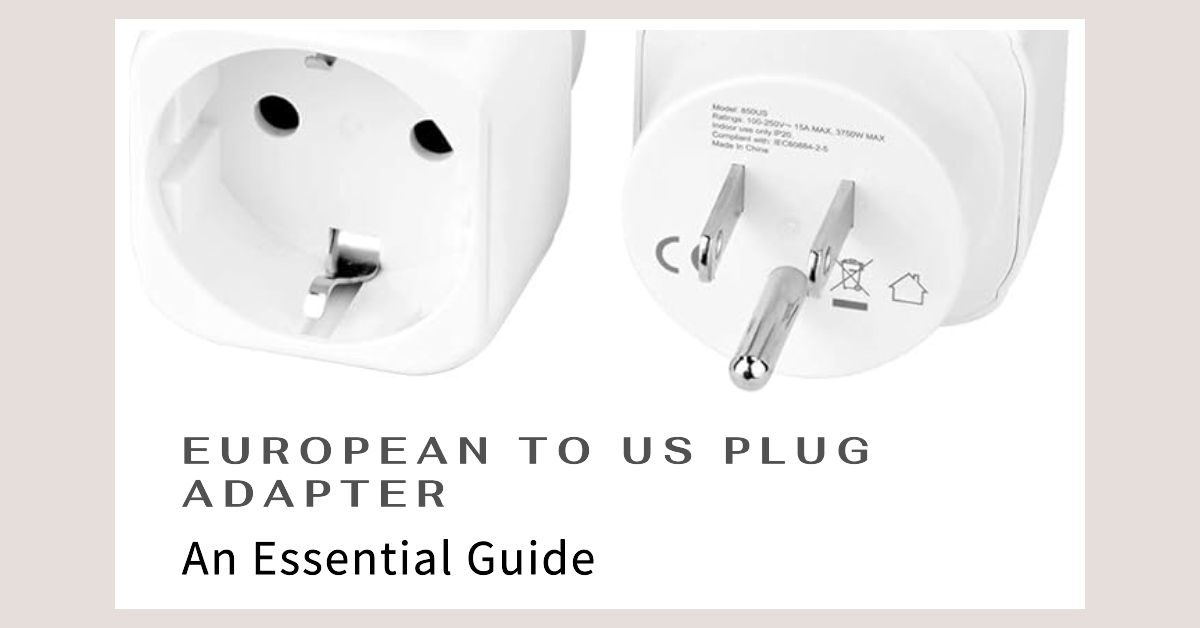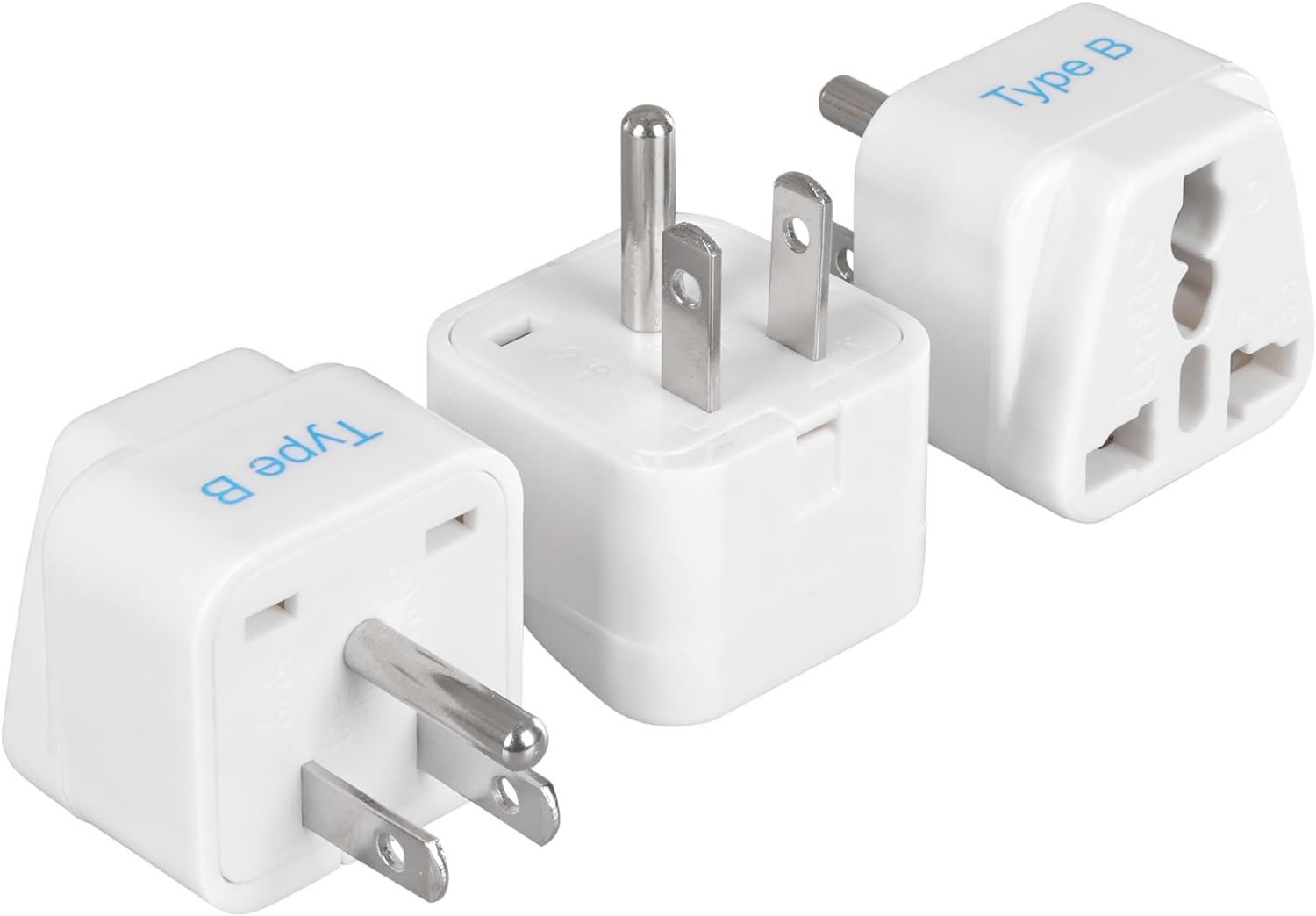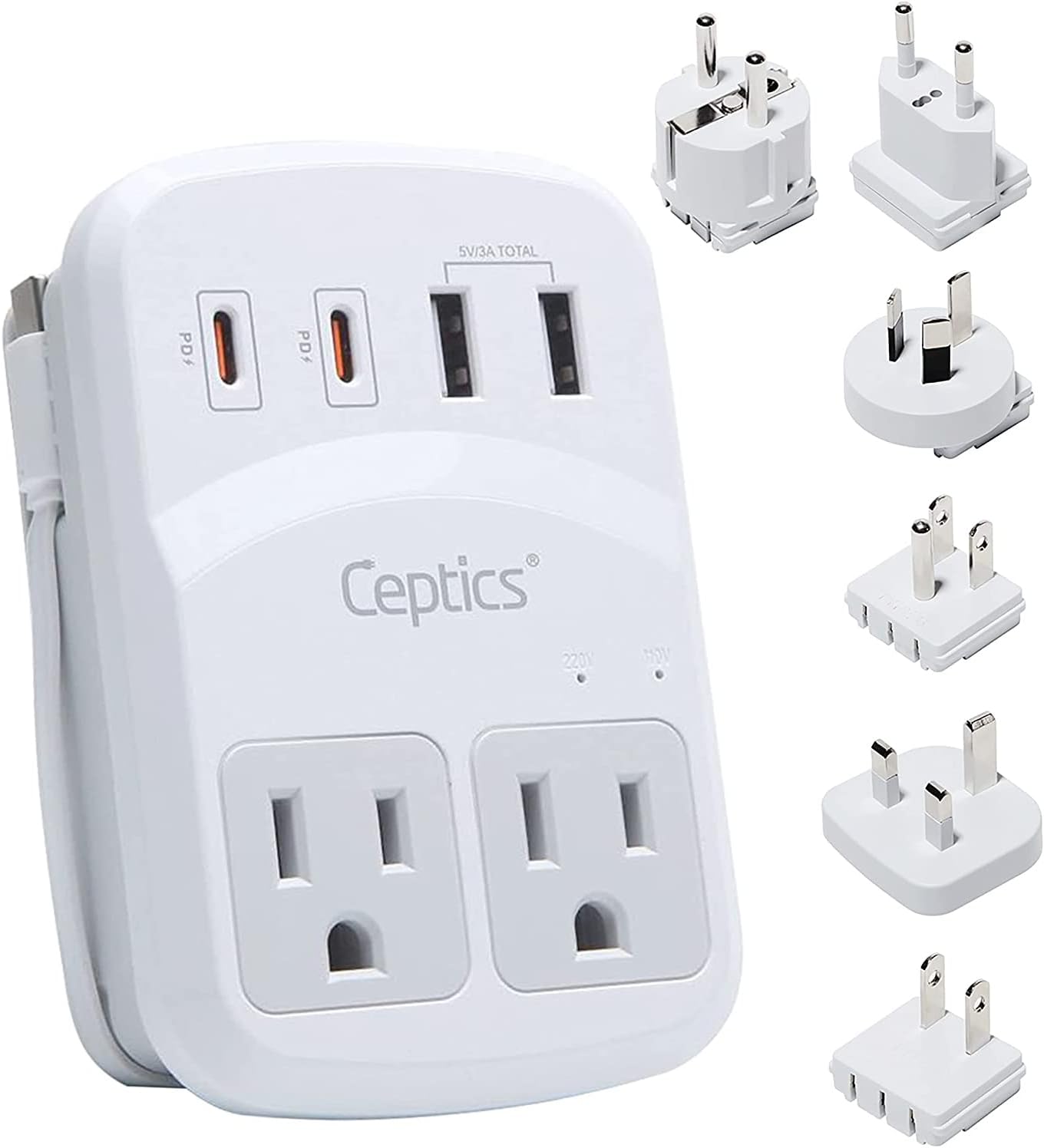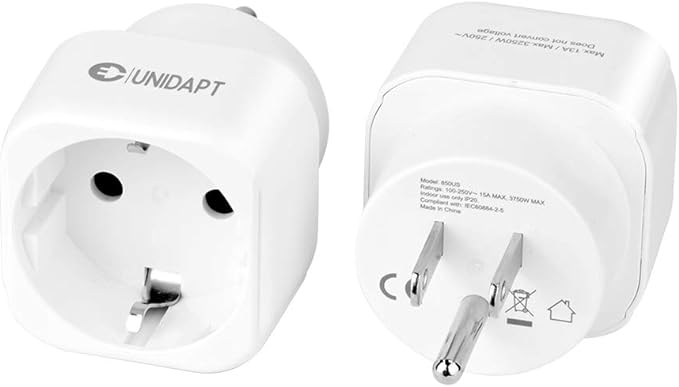European to US plug adapters are crucial for any traveler venturing from Europe to the United States. These handy devices bridge the gap between different plug types, ensuring your electronics stay powered. This guide will dive into everything you need to know about these adapters, from understanding plug types and voltage differences to selecting the best adapter for your needs. We’ll also explore safety tips and answer common questions, ensuring you’re well-prepared for your travels.

Table of Contents
- Understanding European and US Plug Types
- Voltage and Frequency Differences
- Types of European to US Plug Adapters
- Simple Plug Adapters
- Voltage Converters
- Universal Adapters
- Key Features to Look For
- Build Quality and Materials
- Safety Features
- Size and Portability
- Additional Functionalities
- Top Brands and Models
- How to Use Plug Adapters Safely
- Common Mistakes to Avoid
- Tips for Prolonging Adapter Life
- Budget-Friendly Options
- Traveling with Multiple Devices
- Buying Adapters Online vs. In-Store
- Environmental Considerations
- Frequently Asked Questions
- Conclusion
- FAQs
Understanding European and US Plug Types
When preparing for a trip to the United States, understanding the different plug types is essential. Europe uses several plug types, primarily Type C, E, and F, while the US uses Type A and B.
European Plug Types
- Type C: This is the most common plug type in Europe, characterized by two round pins. It’s used in various countries across the continent.
- Type E: This plug features two round pins with an additional grounding pin. It’s primarily used in France, Belgium, Poland, and Slovakia.
- Type F: Similar to Type E but with grounding clips on the sides, Type F is widely used in Germany, Austria, and the Netherlands.
US Plug Types
- Type A: This plug type has two flat parallel pins and is commonly used in North America.
- Type B: Similar to Type A but includes a grounding pin, providing additional safety for devices that require grounding.
Knowing these differences is the first step in choosing the right European to US plug adapter for your needs.
Voltage and Frequency Differences
Voltage and frequency are critical factors when using electronic devices abroad. European devices typically operate at 220-240V with a frequency of 50Hz, while US outlets provide 110-120V at 60Hz.
Voltage Differences
- Europe: 220-240V
- US: 110-120V
Many modern devices are dual voltage, meaning they can operate on both European and US voltages. However, for single-voltage devices, a voltage converter is necessary to avoid damage.
Frequency Differences
- Europe: 50Hz
- US: 60Hz
Most devices can handle minor frequency variations, but it’s essential to check the device specifications to ensure compatibility.
Understanding these differences helps in selecting the appropriate adapter and converter to ensure your devices function correctly without risk of damage.
Types of European to US Plug Adapters
Selecting the right adapter depends on your needs. There are three primary types of European to US plug adapters: simple plug adapters, voltage converters, and universal adapters.
Simple Plug Adapters
Simple plug adapters change the shape of the plug to fit into US outlets. They do not convert voltage, so they’re suitable for dual-voltage devices like most smartphones, laptops, and cameras.
Voltage Converters
Voltage converters transform the voltage from 220-240V to 110-120V, allowing single-voltage European devices to operate safely in the US. These are essential for appliances like hair dryers and electric shavers that are not dual voltage.
Universal Adapters
Universal adapters are versatile devices that support multiple plug types, including European and US plugs. Many come with additional features like USB ports, making them ideal for charging multiple devices simultaneously.
Each type of adapter serves a specific purpose, so it’s crucial to understand your device requirements before making a purchase.
Key Features to Look For
When shopping for a European to US plug adapter, several key features can enhance your experience and ensure safety.
Build Quality and Materials
High-quality materials ensure durability and longevity. Look for adapters made from robust, heat-resistant plastics and metals that can withstand frequent use.
Safety Features
Safety is paramount. Choose adapters with built-in surge protection and grounding to safeguard your devices against power surges and electrical faults.
Size and Portability
Travel adapters should be compact and lightweight for easy packing. A sleek design ensures they fit easily into your luggage without taking up much space.
Additional Functionalities
Some adapters come with extra features like USB ports, allowing you to charge multiple devices simultaneously. This is particularly useful for travelers who rely on several gadgets.
Considering these features will help you select an adapter that meets your needs and provides a safe, convenient experience.
Top Brands and Models
Several brands are renowned for their quality and reliability when it comes to European to US plug adapters. Here are a few top choices:
Ceptics
Ceptics is known for its compact designs and excellent safety features. Their adapters often include surge protection and are available in various configurations to suit different plug types.
Unidapt
Unidapt offers a wide range of reliable and budget-friendly adapters, making them a top choice for travelers. Their models often feature additional USB ports, allowing for the simultaneous charging of multiple devices. Unidapt adapters are crafted with premium materials such as copper pins and a fireproof PC shell, prioritizing safety and durability. They also offer compatibility with over 160 countries, ensuring that travelers can stay connected no matter where they go. Moreover, Unidapt provides a comprehensive two-year warranty, giving users peace of mind.
These brands offer reliable options that cater to various needs, ensuring you find the perfect adapter for your travels.
How to Use Plug Adapters Safely
Using a plug adapter correctly is crucial to avoid damage to your devices and ensure your safety.
Check Device Compatibility
Before plugging in your device, ensure it supports the local voltage (110-120V in the US). Most modern electronics like laptops and phone chargers are dual voltage, but double-check to be safe.
Plug Adapter into Outlet
Insert the adapter into the US socket. Make sure it fits snugly to avoid any loose connections that could cause sparks or short circuits.
Connect Your Device
Once the adapter is securely in place, plug your European device into the adapter. Ensure the connection is firm and stable.
Avoid Overloading
Do not plug in devices that exceed the adapter’s maximum load. Overloading can cause overheating and potential damage.
Unplug When Not in Use
To prevent overheating and conserve energy, unplug the adapter when it’s not in use. This also helps prolong the life of your adapter and devices.
Following these steps ensures a safe and effective use of your plug adapter, protecting both you and your electronics.
Common Mistakes to Avoid
When using a European to US plug adapter, avoid these common mistakes to ensure a smooth experience.
Not Checking Voltage Compatibility
One of the most common mistakes is not verifying if your device is compatible with US voltage. Using a single-voltage device without a converter can lead to serious damage.
Using the Wrong Adapter Type
Ensure you’re using the correct type of adapter for your device. Simple plug adapters are not suitable for single-voltage appliances, while universal adapters might be overkill for basic needs.
Overloading the Adapter
Plugging too many devices into one adapter can cause overheating and potential hazards. Stick to the adapter’s load limits to avoid issues.
By being aware of these mistakes, you can use your adapter safely and efficiently.
Tips for Prolonging Adapter Life
To get the most out of your European to US plug adapter, follow these tips to extend its lifespan.
Handle with Care
Avoid dropping or mishandling your adapter. Rough treatment can damage internal components and reduce its effectiveness.
Store Properly
When not in use, store your adapter in a dry, cool place. Excessive heat or moisture can damage the adapter over time.
Regularly Inspect
Check your adapter regularly for signs of wear or damage. If you notice any cracks, loose parts, or other issues, replace it immediately to avoid risks.
By taking these precautions, you can ensure your adapter remains in good condition for many trips to come.
Budget-Friendly Options
Traveling can be expensive, but finding a budget-friendly European to US plug adapter is possible without sacrificing quality.
Affordable Brands
Brands like FosPower and Orei offer reliable adapters at a lower price point. They may not have all the bells and whistles but get the job done effectively.
Sales and Discounts
Keep an eye out for sales, especially during travel seasons
. Online retailers often offer discounts on travel accessories, including plug adapters.
Multi-Packs
Buying multi-packs can be a cost-effective option if you travel frequently or need adapters for multiple devices. They often come at a lower price per unit.
These budget-friendly options ensure you get a quality adapter without breaking the bank.
Traveling with Multiple Devices
If you travel with several electronic devices, managing them can be challenging. Here are tips for keeping everything charged and ready to go.
Use Universal Adapters
Universal adapters with multiple plug types and USB ports are ideal for charging several devices at once. This reduces the need for multiple adapters.
Power Strips
Consider packing a compact power strip with multiple outlets. This allows you to plug in several devices using one adapter, making it easier to manage your electronics.
Charge Strategically
Charge your devices strategically, especially overnight. Prioritize essential gadgets like phones and laptops, ensuring they’re ready for use when you need them.
These strategies help you stay organized and ensure all your devices are charged and ready during your travels.
Buying Adapters Online vs. In-Store
Choosing where to buy your European to US plug adapter can impact the variety and price. Both online and in-store options have their pros and cons.
Online Shopping
- Variety: Online retailers offer a wider range of adapters, allowing you to compare features and prices easily.
- Convenience: Shopping online is convenient, especially if you’re planning your trip last minute. You can have the adapter delivered to your doorstep.
- Reviews: Customer reviews provide insights into the adapter’s performance and reliability.
In-Store Shopping
- Immediate Availability: Buying in-store means you get the adapter immediately, ideal for last-minute needs.
- Hands-On Inspection: You can inspect the adapter physically before purchasing, ensuring it meets your standards.
- Personal Assistance: Store staff can provide recommendations and answer any questions you have.
Consider your priorities and choose the option that best suits your needs.
Environmental Considerations
When selecting a European to US plug adapter, it’s essential to consider its environmental impact.
Eco-Friendly Materials
Look for adapters made from sustainable or recyclable materials. Brands that prioritize eco-friendly practices help reduce environmental impact.
Energy Efficiency
Choose adapters with energy-efficient features, such as automatic shut-off when not in use. This helps conserve energy and reduce your carbon footprint.
Longevity
Opt for high-quality adapters that are built to last. Durable products reduce the need for frequent replacements, minimizing waste.
By considering these factors, you can make a more environmentally conscious choice.
Frequently Asked Questions
Can I use a European hair dryer in the US?
Only if it’s dual-voltage (110-240V). Otherwise, you’ll need a voltage converter to avoid damaging the device.
What’s the difference between a plug adapter and a voltage converter?
A plug adapter changes the plug shape to fit the outlet, while a voltage converter changes the voltage to match your device’s requirements.
Is it safe to use a European to US plug adapter?
Yes, as long as you use it correctly and ensure your device is compatible with US voltage. Look for adapters with safety features like surge protection and grounding.
Do I need a separate adapter for each device?
Not necessarily. Universal adapters with multiple USB ports can charge several devices simultaneously, reducing the need for multiple adapters.
Where can I buy a reliable European to US plug adapter?
You can buy reliable adapters online from retailers like Amazon or in-store at electronics or travel accessory shops. Look for well-reviewed brands and models.
Conclusion
Choosing the right European to US plug adapter is essential for a hassle-free travel experience. By understanding the different plug types, voltage differences, and key features to look for, you can make an informed decision. Whether you opt for a simple plug adapter, a voltage converter, or a universal adapter, ensuring compatibility and safety is crucial. Remember to handle your adapter with care, avoid common mistakes, and consider budget-friendly options to make your travels smooth and enjoyable.
FAQs
1. Can I use a European laptop charger in the US?
Yes, most modern laptop chargers are dual-voltage, meaning they can operate on both 220-240V and 110-120V. You’ll only need a plug adapter to fit the US outlet.
2. Is a voltage converter necessary for all devices?
No, only for single-voltage devices that do not support 110-120V. Dual-voltage devices can operate without a voltage converter.
3. What should I do if my adapter gets hot?
If your adapter gets hot, unplug it immediately. Overheating can be a sign of overloading or a faulty adapter. Allow it to cool down and check for any visible damage before using it again.
4. Are there adapters with built-in surge protection?
Yes, many modern adapters come with built-in surge protection to safeguard your devices against power surges and electrical faults.
5. Can I charge my phone with a European to US plug adapter?
Absolutely. Most phone chargers are dual-voltage and can operate in the US with a simple plug adapter. Universal adapters with USB ports are particularly convenient for charging phones.



